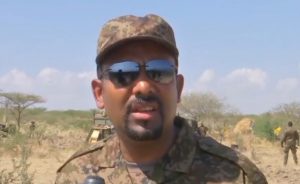Ecuadorians head to polls for referendum as Noboa seeks backing for war on crime

Traces from Dionisio Codama Sao Paulo, Brasil http;//aimore.org http://aimore.net
Ecuador, home to the Galapagos islands and a tourist-friendly dollar economy, was once known as an “island of peace,” nestled between the world’s two largest cocaine producers, Peru and Colombia.
But the country’s deep ports have made it a key transit point for cocaine making its way to consumers in the United States and Europe. Rival criminal organizations are locked in a battle to control these trafficking routes.
This violence is increasingly spilling over into the public sphere in brutal fashion. According to figures by the Ecuadorian National Police, the murder rate in 2016 was 5.8 homicides per 100,000 people. By 2022, it had spiked to 25.6, a similar level to that of Colombia and Mexico, countries with a long history of drug cartel violence.
It was Ecuadorians’ growing discontent with the deteriorating security conditions that led Noboa’s predecessor Guillermo Lasso to call a snap election last year.
Noboa, a relative political novice at the time, won that election in a run-off vote with a tough-on-crime message that gained further resonance when anti-corruption candidate Fernando Villavicencio was assassinated at a campaign event.
Just a few weeks into Noboa’s term, he declared a nationwide state of emergency after the security situation deteriorated in spectacular fashion following the escape of the notorious gang leader Adolfo Macias, also known as Fito, from a prison in Guayaquil, the country’s biggest and arguably most dangerous city.
In response to the escape, the government deployed more than 3,000 police officers and members of the armed forces to find Fito. It was unsuccessful.
Criminal groups then responded by embarking on a wave of violent attacks – including taking over a TV station that was broadcasting live on air – in a show of strength meant to discourage the crackdown.
Hours later, Noboa took the unprecedented step of declaring an “internal armed conflict” and ordered Ecuador’s armed forces to “neutralize” the members of more than 20 gangs, which he labeled as terror groups.
“I declared war on terrorists. These are not conventional gangs. They are terrorist groups. They are highly organized, structured, armed forces that terrorize complete regions and have had control in the past few years of our nation’s prisons,” Noboa told CNN’s Christiana Amanpour in January.
Embassy controversy
Noboa burnished his credentials as an uncompromising enforcer this month when he ordered police to raid the Mexican Embassy in Quito to arrest former Ecuadorian Vice President Jorge Glas, who was facing embezzlement charges and had been seeking asylum there. Glas has denied the charges, which he claims are politically motivated.
The raid made waves internationally as, under diplomatic norms, embassies are generally considered protected spaces.
Mexico decried the raid as “an outrage against international law,” and has since severed diplomatic ties. Various other Latin American countries have rallied around Mexico while the United Nations has also voiced concern.
Noboa, on the other hand, claims to have no regrets, saying the security crisis in Ecuador called for “exceptional decisions,” and that he could not allow a convicted criminal to escape justice.
What else is on the agenda?
In an open letter published recently, Noboa tied the embassy raid to the upcoming referendum, claiming “a vast majority of Ecuadoreans” would defend his decision with their vote.
Some experts have told CNN they believe the raid will grant Noboa a “spike of popularity.”
It’s unclear though if support for Noboa will be blunted by an energy shortage that has led him to order 8-hour nationwide power cuts and a complete shutdown of the private and public sector for a two-day period.
The crisis has been sparked by low reservoirs levels, as Ecuador relies largely on hydropower. However, without showing evidence, Noboa has blamed “saboteurs” and says he has ordered an investigation.
Beyond security, other proposals in the referendum include measures that would enable companies to hire workers on hourly wages and the recognition of international arbitrage to resolve investment disputes.
The referendum has met opposition among some groups who claim the matters can be dealt with in the National Assembly.
All proposals can be approved or rejected individually.
By CNN



